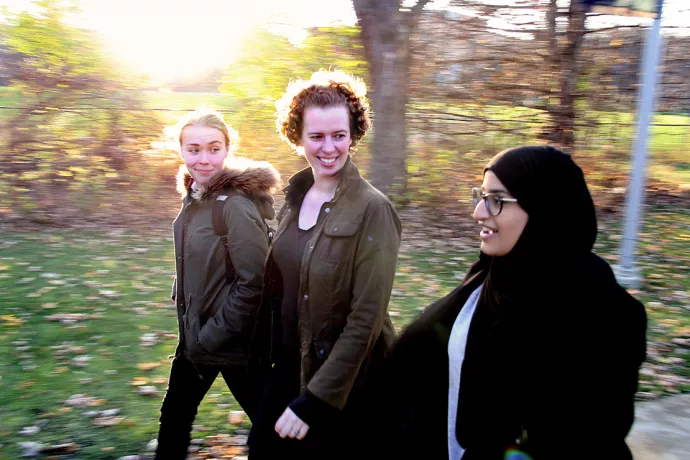
Showing Kindness: Biology professor strengthens human connections during uncertain times
Associate Professor Fiona Rawle is reaching out to students and fellow faculty members to foster a community built on kindness, where compassion is the cornerstone.
“If ever there was a time for a pedagogy of kindness, it’s now,” says biologist Rawle, who takes a genuinely caring approach to teaching, creating a space where it’s safe to be honest, vulnerable and open. As associate dean of undergraduate studies at UTM, that philosophy of building meaningful human connections is being shared with faculty and students alike at a time when uncertainties make the need for kinship even more important.
In partnership with Ann Gagné, educational developer with Robert Gillespie Academic Skills Centre, and Simone Laughton, head of library and instructional materials, Rawle has been providing support for faculty, who are also facing a new set of challenges along with their students. The team hosts teaching and learning exchanges over the lunch hour. Topics include teaching remotely, course design, learning outcomes in an online environment and helping students.
“Ann (Gagné) and I are blown away by how much faculty care,” says Rawle. “How everyone has pulled together in the last weeks is amazing.”
While faculty have adapted remarkably to the new reality, it hasn’t been easy. Instructors are stretched right now, Rawle says, adding there’s been a lot of conversations about how much of their challenges they should share with students.
Those discussions prompted a tweet from Rawle earlier this month, asking students and professors the one thing they wanted the other to know. It led to an open and heartfelt discussion, with faculty sharing that they are worried about many things, miss their students and know their students are resilient. Students shared their appreciation for the hard work their professors have put in and their worries about letting them down. Underscoring it all was a need to be kind, and reassurance that everyone is in this together.
“Now, it’s even more important to have open, honest and vulnerable communication,” Rawle says.
That human approach has underscored her interactions with students over the years. In September Rawle sent a warm welcome letter to her biology class, she ends courses with a closing letter letting students know grades don’t define a person, and she talks with her students openly about failure.
“I did spectacularly horrible in organic chemistry,” she says, noting she may not have even opened the book. She sometimes shares her transcript with her classes as she talks about what she learned and how she changed. The message she tries to convey is that it’s not just about the final product, grade or degree, but is about the journey it took to get there.
She also came up with strategies for engaging with students on a personal level, offering walking office hours. She found going for walks in nature around campus allowed for deeper, more meaningful conversations.
With those in-person interactions temporarily off limits, professors must now find creative ways to connect using technology, being mindful that the learning outcomes define how technology is used and not the other way around.
“You have to go further to make a personal connection,” Rawle explains. That might mean a personal video introduction at the start of a course and a thoughtful wrap up at the end. It’s finding new ways to provide feedback to students while helping them become autonomous learners. It’s collaborating in new and inventive ways to create connections between students and students and the instructor. It also means being human and open about fears, challenges and failures.
Rawle says there are going to be mistakes and it’s important to be honest about those mistakes.
“The idea we can do everything well all the time is a false narrative,” she says. “Practice makes progress, not perfect.”
